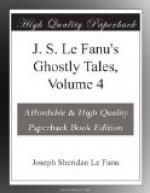“The bully” watched his opportunity, and contrived to provoke Ned Moran, while drinking in a public-house with a party of friends, into an altercation, in the course of which he failed not to put such insults upon his rival as manhood could not tolerate. Long Ned, though a simple, good-natured sort of fellow, was by no means deficient in spirit, and retorted in a tone of defiance which edified the more timid, and gave his opponent the opportunity he secretly coveted.
Bully Larkin challenged the heroic youth, whose pretty face he had privately consigned to the mangling and bloody discipline he was himself so capable of administering. The quarrel, which he had himself contrived to get up, to a certain degree covered the ill blood and malignant premeditation which inspired his proceedings, and Long Ned, being full of generous ire and whiskey punch, accepted the gauge of battle on the instant. The whole party, accompanied by a mob of idle men and boys, and in short by all who could snatch a moment from the calls of business, proceeded in slow procession through the old gate into the Phoenix Park, and mounting the hill overlooking the town, selected near its summit a level spot on which to decide the quarrel.
The combatants stripped, and a child might have seen in the contrast presented by the slight, lank form and limbs of the lad, and the muscular and massive build of his veteran antagonist, how desperate was the chance of poor Ned Moran.
“Seconds” and “bottle-holders”—selected of course for their love of the game—were appointed, and “the fight” commenced.
I will not shock my readers with a description of the cool-blooded butchery that followed. The result of the combat was what anybody might have predicted. At the eleventh round, poor Ned refused to “give in”; the brawny pugilist, unhurt, in good wind, and pale with concentrated and as yet unslaked revenge, had the gratification of seeing his opponent seated upon his second’s knee, unable to hold up his head, his left arm disabled; his face a bloody, swollen, and shapeless mass; his breast scarred and bloody, and his whole body panting and quivering with rage and exhaustion.
“Give in, Ned, my boy,” cried more than one of the bystanders.
“Never, never,” shrieked he, with a voice hoarse and choking.
Time being “up,” his second placed him on his feet again. Blinded with his own blood, panting and staggering, he presented but a helpless mark for the blows of his stalwart opponent. It was plain that a touch would have been sufficient to throw him to the earth. But Larkin had no notion of letting him off so easily. He closed with him without striking a blow (the effect of which, prematurely dealt, would have been to bring him at once to the ground, and so put an end to the combat), and getting his battered and almost senseless head under his arm, fast in that peculiar “fix” known to the fancy pleasantly by the name of “chancery,” he held him firmly, while with monotonous and brutal strokes he beat his fist, as it seemed, almost into his face. A cry of “shame” broke from the crowd, for it was plain that the beaten man was now insensible, and supported only by the herculean arm of the bully. The round and the fight ended by his hurling him upon the ground, falling upon him at the same time with his knee upon his chest.




